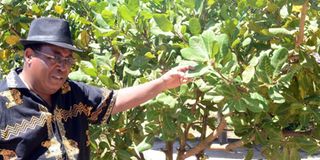Group plans to borrow leaf from Tanzania in cashew nut revival

Chairman of the Coast Nut Growers Association John Mumba shows some of his cashew nut trees at his 12-acre Mimando farm in Kikambala, Kilifi County earlier.
What you need to know:
- The nut has traditionally been one of the main sources of livelihoods for farmers in Kwale, Kilifi, Tana River Mombasa and Lamu counties.
- Kenya’s production stands at a meagre 5,000 tonnes annually having dropped from 40,000 tonnes decades ago, compared to Tanzania’s 300,000 tonnes.
Agriculture Principal Secretary Hamadi Boga said revival of the sector is key to the rebirth of the rural economy at the coast.
In early 1960s, Kenya was among the only two African countries that produced high quality cashew nuts for the world market.
Today, the country is not only on the list of nations that grow the crop, it no longer exports the nuts as the subsector reels from a number of challenges that have hit production.
Kenya, Mozambique and Tanzania were in the same league of countries whose nuts were highly sought after in the global market.
As Kenya’s production of cashew plummets, international price of the commodity has been on the rise to currently hit Sh108,000 a tonne.
The decline of the cashew subsector at the Kenya’s coast came at a huge cost for farmers in five counties who heavily relied on the crop as their major source of income.
Export of cashew nuts
The nut has traditionally been one of the main sources of livelihoods for farmers in Kwale, Kilifi, Tana River Mombasa and Lamu counties.
Tanzania has now emerged as a major player in export of cashew nuts, thanks to high level of agronomical practices and massive State support.
Kenya’s production stands at a meagre 5,000 tonnes annually having dropped from 40,000 tonnes decades ago, compared to Tanzania’s 300,000 tonnes.
However, all is not lost for farmers at the coast as the Ministry of Agriculture and ETG Farmers Foundation (EFF) have initiated plans to revive the crop to lift small-scale growers’ earnings.
Smallholder farmers
The project, which is expected to kick off in the next three months, aspires to transform the rural coastal region livelihoods status by impacting more than 700,000 smallholder farmers in the next seven years through activating the cashew nut value chain and increasing production to more than 200,000 tonnes every year.
“We plan to give services directly to farmers under this programme in order to lift their income from cashew nut,” said Mahesh Patel chairman of the EFF.
Under this programme, Mr Mahesh says, the foundation will import seedlings from Tanzania and issue them to farmers as they seek to revive the once vibrant sector.
The scheme will largely borrow a leaf from the success in Tanzania and Mr Mahesh says they are going to use the same model to spur productivity at the Kenya’s coast.
In 2018, EFF introduced cashew nut project in Western Province of Zambia in a scheme that was supported by African Development Bank and the government of Zambia.
It has largely been the norm that cashew nuts only grows in coastal environment but Zambia, which doesn’t have a coastal line has defied this myth.
It is because of this that the EFF under this programme would expand the crop beyond Kenya’s coast to other regions such as Makueni, Kiambu and Taita Taveta, which have been found to have suitable climate for these nuts.
Industry collapsed
Kenya’s cashew nut industry collapsed as farmers were disgruntled following the ban on export of raw nuts leading to lack of local market, deficiency of new varieties and absence of extension officers to advise growers on good agronomical practices.
Teresiah Munga, head of Kalro centre in Mtwapa at the Coast said the agency will soon release four new varieties that are still in the nursery. They are high-yielding than the known types, the agency says.
“These new varieties have the ability to produce up to a hundred kilogrammes in a year, which is way far above the current breeds that would hardly produce 20,” said Ms Munga.
Agriculture Principal Secretary Hamadi Boga said revival of the sector is key to the rebirth of the rural economy at the coast.
“The cashew nut holds the promise for economic revival of rural parts of the Coast region and power agroprocessing. To make Kenya a leading player in the world cashew nut market, all major stakeholders must act together and resolve the systemic bottlenecks grappling the sector,” said Prof Boga.
Through initiating a local agroprocessing revolution, it is anticipated that this project will create 500,000 direct and indirect jobs along the value chain and generate more than $300 million (Sh30 billion) in forex earnings.




